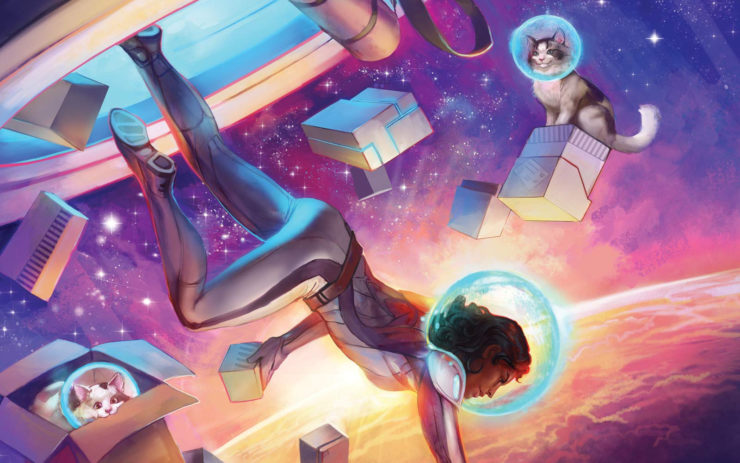Humorous science fiction is an increasingly popular sub-genre with some notable examples: the Hitchhiker’s Guide to the Galaxy, Discworld series of Terry Pratchett, Red Dwarf. Or for a more contemporary reference, writer Alex Shvartsman edits the annual Unidentified Funny Objects anthology.
Science fiction is praised for its progressive attitudes, and yet there still remain gaps of representation. And, in light of the #PublishingPaidMe Twitter hashtag that trended earlier this month, there are noticeable disparities in pay as well. Oftentimes, certain voices aren’t heard, and this gap can be widened once we move into niche markets or sub-genres.
So if you like funny Science Fiction and, like me, have some reading time on your hands, I’d like to turn your attentions to a pair of Latinx authors with hot new books coming out this Fall.
Terminal 3, author Illimani Ferreira’s debut novel, is expected to come out this September from Möbius Books. Prime Deceptions by Valerie Valdes is also expected to come out this September from Harper Voyager and is a sequel to her previous book, Chilling Effect.
In Terminal 3, a naïve yet goodhearted main character named Gabe begins to work as a lowly security guard at the interestingly-named Kornelia Kardashian-Bezos Spaceport. Earth in this universe is merely a hub of travel for aliens across the galaxy and not the ideal place to settle down in. Gabe has had a hard life in the bustling Greater Los Angeles of the twenty-second century, bouncing from one blue collar job to another after a youth spent in foster care (all due to a fluke temporal ‘entropic anomaly’ at an airport in the past that separated him from his mother). In this dark comedy about humans and aliens living together under physical and economic restraints, cultural misunderstanding can lead to an embarrassing faux pas or an abrupt whirlwind of chaos and violence. Sensitivity to alien needs, sensibilities, and cultural differences is atypical. And always looming over Gabe’s co-workers and a cast of supporting characters is the great ‘slow yet irreversible collapse of all the universe’ set into motion by the temporal anomaly which a time-regulating committee must work tirelessly to mend.
Author Illimani Ferreira was born in Brazil and currently living in Delaware, though has moved around and lived in other countries which gives his work an international flair. His humor has a dark slant as he satirizes realities all too painful and real even when dressed in the trappings of a fictional world. As he puts it, his Latino identity doesn’t steer his writing as much as it illuminates his perspective. He also feels the same about his identity as a cis gay man.
Prime Deceptions returns readers to the ongoing adventures of roguish, wise-cracking Eva Innocente, captain of La Sirena Negra as she pursues an interstellar crime syndicate known as the Fridge. For company, she has her talented crew, twenty rambunctious kittens with psychic abilities, and a number of colorful acquaintances and frenemies that she crosses paths with as she goes on a series of side missions. Whereas in the previous novel where Eva had to take on dangerous tasks in order to meet the Fridge’s demands and free her hostage sister, Prime Deceptions delves a bit more into the universe and lore. There is an ancient alien race called the Proarkhe that has built a number of navigational gates, and mastery over such advanced technology is sufficient reason for bad actors to engage in all sorts of shadiness – including wanton acts of kidnapping and violence.
Buy the Book


Prime Deceptions
Valerie Valdes’ novels place a Latina in a setting that all too often does not have much Latinx representation, and when it does, only in some kind of limited supporting capacity. The setting resembles Star Trek, but with a diverse cast, pansexuality, and other identities and expressions that seem more relevant and reflective of the society we know today.
In Terminal 3, humor is not only derived from the uncontrollable cosmic forces that affect the life of our hero, but also the seemingly callous officials and Kafka-esque bureaus (such as the aptly-named Department of Homeworld Security) that lifelessly go through their daily drudge of paperwork and discharge their duties – deporting aliens on a whim and ensuring that the never-ending industrial machine doesn’t stop moving. Underneath all of the acerbic wit is the nihilistic attitude that despite anyone’s noble efforts, nothing will fundamentally change. The system at hand is greater than any one person or even a collection of individuals. Even in the twenty-second century, anxieties over rent and gentrification remain.
Prime Deceptions touches on uncomfortable and controversial topics like how easily our attitudes about rebels and freedom fighters can change depending on our own proximity to power. We also see the consequences of the privatization of war, forced intellectual labor, and a kind of soft colonizer mentality that may shade the outwardly noble efforts of space exploration and settlement. Even in a fictional world that consciously borrows (and often clearly spoofs) many well-known Science Fiction tropes, it still bears a passing resemblance to our own: human supremacist bigots harassing aliens, large destabilizing wars leading to a flood of refugees, and statues of old figures with problematic pasts that no longer seem worthy of commemoration. In this universe, corporations seem to hold even more power than the actual ones that they’re loosely based on. And privateering captains and crews are often reduced to illicit operations like smuggling out of pure economic necessity.
Writers and readers of today’s Science Fiction are becoming increasingly aware of old clichés, stereotypes, and tropes. Humorous science fiction in many ways is a response to that growing savviness. Science fiction has moved towards its own post-modernist phase and is increasingly self-aware and self-referential. It can be meta, consciously avoid old conventions, or seek to deliberately subvert them. Humor can also of course be a form of release, especially in difficult times. A blowout valve for our anxieties. These worlds, while fictional and alien, have some underpinnings all too painfully familiar to us. At times when we feel voiceless, art can be used as a way to brutally satirize the powers that be and take some of that power back.
Jonathan E. Hernandez (@jhernandez13) is an author, visual artist, and organizer with the Brooklyn Speculative Fiction Writers. After an honorable discharge from the military, he went back to school to study creative writing and pursue a career better suited to his muse. His debut novel, One Day as a Lion, comes out this year with Aethon Books. A Nuyorican originally from the Bronx, he now lives in Astoria, New York with his partner Anita and a cat named Jonesy.










